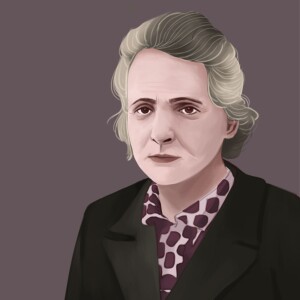
Tuesday Dec 12, 2023
Curie’s Legacy: The Life and Achievements of Ève Curie
Madame Curie book summary
"Madame Curie" is a biography written by the Polish author Eve Curie about her mother, the renowned scientist Marie Curie. The book provides a detailed account of Marie Curie's life, from her childhood in Poland to her groundbreaking discoveries in the field of radioactivity.
The story begins by delving into Marie Curie's early years, describing her upbringing in a loving but impoverished family. Despite facing numerous obstacles, Curie's determination and passion for learning eventually led her to study physics and chemistry at the Sorbonne in Paris.
The book then highlights Marie Curie's career and accomplishments, particularly her groundbreaking work on radiation. Together with her husband, Pierre Curie, Marie conducted groundbreaking research on radioactivity, leading to the discovery of new elements such as polonium and radium. These discoveries not only revolutionized the field of science but also earned Curie the distinction of being the first woman to win a Nobel Prize.
The biography also explores the personal challenges and sacrifices that Marie Curie faced throughout her life. It delves into her struggles as a female scientist in a male-dominated field, as well as the tragic loss of her beloved husband Pierre and the subsequent preparations she made for her daughters' futures.
The book also sheds light on Marie Curie's later years and her tireless efforts to promote the use of radiology in World War I, leading to the creation of mobile radiography units that saved countless lives. Her commitment to scientific discovery and her dedication to her work continued until her death in 1934.
Overall, "Madame Curie" is a captivating biography that showcases the extraordinary life and achievements of Marie Curie, highlighting her groundbreaking scientific contributions, her perseverance in the face of adversity, and her enduring legacy as one of the most influential scientists in history.
Quotes of Madame Curie book
- "Nothing in life is to be feared, it is only to be understood. Now is the time to understand more, so that we may fear less."
- "Be less curious about people and more curious about ideas."
- "I am one of those who think that science has great beauty. A scientist in his laboratory is not only a technician: he is also a child placed before natural phenomena which impress him like a fairy tale."
- "You cannot hope to build a better world without improving the individuals. To that end, each of us must work for our own improvement and, at the same time, share a general responsibility for all humanity."
- "Nothing in life is to be accomplished without passion."
What are important facts about Madame Curie?
- Madame Curie, whose full name was Marie Skłodowska Curie, was a Polish-born physicist and chemist. She later became a naturalized French citizen.
- Curie is best known for her groundbreaking research on radioactivity, which earned her two Nobel Prizes. In 1903, she became the first woman to receive a Nobel Prize in Physics, and in 1911, she became the first person, and still the only woman, to receive a second Nobel Prize, this time in Chemistry.
- She discovered two radioactive elements, polonium and radium, and coined the term "radioactivity" to describe the spontaneous emission of radiation.
- Madame Curie's research was not only significant scientifically but also had important medical applications. During World War I, she developed mobile radiography units, commonly known as "petites Curies," to provide X-rays for diagnosing injuries on the battlefront.
- Despite her achievements, Curie faced gender discrimination throughout her career. She often had to work in poorly equipped laboratories and struggled to be taken seriously in the male-dominated scientific community.
- Curie's work with radioactive materials eventually led to health complications, and she succumbed to aplastic anemia, likely caused by long-term exposure to radiation, in 1934.
- Her legacy lives on through the Curie Institute in Paris, France, which remains a leading research center for cancer treatment and continues to honor her contributions to science.
- In recognition of her accomplishments, Curie's image and name have been commemorated in various ways. She has appeared on postage stamps, currency, and has been the inspiration for numerous books, movies, and plays.
No comments yet. Be the first to say something!